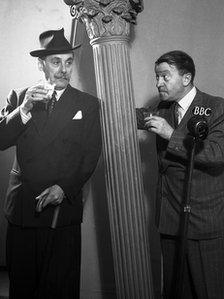First minister's questions: 'Can I do you now Sir?'
- Published
Perhaps it was his extended spell in the RAF, but my late father was much given to deploying phrases from the wartime comedy ITMA.
Without warning, he would intone, "I go, I come back". Or "can I do you now Sir?".
But his great favourite was: "After you Claude - no, after you Cecil".
I thought of that particular aphorism as I witnessed questions to the first minister today. (Who said I should have been paying more attention? Take that person's name.)
Anyway, our leaders all seemed to be similarly focused upon shifting attention from their own party positions on to those of their rivals. It became a game of multi-dimensional chess.
For example, Willie Rennie of the Liberal Democrats had an invitation to offer to Alex Salmond.
Say independence is a no go, he prefaced, would you consider working with me to win more devolved powers for Holyrood?
That preface, of course, posed a slight problem for Mr Salmond. He did not envisage such a scenario and was, understandably, less than keen to talk it up.
En passant, Mr Salmond tried another gambit.
He reminded Willie Rennie that his party, the Liberal Democrats, had previously refused to enter a coalition with the SNP because they did not want a referendum on independence.
Now, the FM said, Mr Rennie's party was ensconced in a Westminster pact with the Tories - who want a referendum on Europe, entirely contrary to Lib Dem policy. (Nick Clegg called it "implausible" today.)

Jack Train with Tommy Handley in It's That Man Again in 1947
To their credit, Mr Rennie and his small but perfectly formed band of MSPs had the good grace to smile broadly at this palpable hit.
Ruth Davidson of the Tories also spotlighted that European referendum - while shifting ground on to another plebiscite, that on offer from the SNP on the topic of Scottish independence.
She argued that Mr Salmond was intent on depriving Scots of the prospect of participating in Mr Cameron's ballot.
That is because the Euro poll would only take place around 2017 or so, midway through the next Westminster parliament - and after a putative renegotiation of the terms of Britain's membership.
Assuming her most indignant voice, she noted that, by then, Scotland could be independent, if Mr Salmond had his way - and so excluded from the Euro poll.
In response, the FM politely thanked Ms Davidson for forecasting both an SNP victory in the referendum and at a subsequent Scottish general election. Ms Davidson also had the grace to grin.
'Extensive flaws'
The sharpest - and certainly the longest - exchanges were between Mr Salmond and Labour's Johann Lamont.
They were extra-long because Elaine Smith, in the chair, granted the Labour leader an extra question on the grounds that her earlier efforts had been met with loud barracking.
Ms Lamont seized the chance to list an extensive series of flaws which she detected in the first minister and his team.
Her main theme was Europe: what price independent Scottish entry?
But we also heard about hospital treatment delays, the Ryder Cup and independence polling on the way to her conclusion which was that Alex Salmond welcomed Tory rule in the UK because he was able to stimulate grievance in Scotland by contrast.
Although a little multi-faceted, it was an effective attack. But Mr Salmond had a rebuttal ready.
In particular, he offered details on improving hospital treatment times: an indication to this observer that he had expected to be asked predominantly about that, rather than Europe.
But his general point dealt with party preferences.
It was wrong to suggest that he "loved" the Tories, as Ms Lamont had suggested. Rather, he noted acerbically, it was Labour which was involved with the Tories in a joint campaign to thwart independence.
And that's it. As my dad would have said, TTFN.